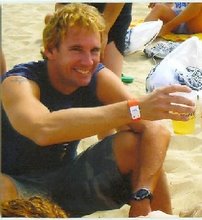So, browsing through my triathlon blog I found this jem. It's in there, if I remember, because it predates this one. Guess I'm gonna have to scour it for other gems.
From May 2006:
So Amy sent out an e-mail yesterday to a bunch of people asking how they relieve stress, for some story she's working on. She said be creative. I said does creative = truthful, and she said "of course not." So I started writing, only to later find out she wanted brevity. I'm not so much with the brevity so, long story short (ironically), she's not using it. Which means I can post it here.
(fictional work to follow)
Being a trauma surgeon can be very stressful. I'm presented with emergent cases and many, many times I am the only thing between those critically-injured peoples' lives and deaths. In any given night I may see gaping head injuries, gunshot victims with sucking chest wounds, little kids who've been mauled by pit bulls, impalements, amputations and everything else you can imagine. And some things you can't.
And the thing is, the patients aren't people to me. They are just injuries. I focus on their vital signs and what's bleeding, and that's about it. My only concern is to stabilize them and fix what's broken, torn or severed. It sounds harsh at best and inhuman at worst, but trust me--it's the only way to do my job. If I get caught up in them as people, then I'm distracted. And if I'm distracted, well, game over. So I never hear their stories. Oh sure, I sometimes hear about how they got to be in the condition in which they are presented: the drive-by shooting, the fall from a ladder or the car accident. But I don't hear about their families, their jobs or their problems. I don't get to hear those stories.
Nor do I want to. Those stories, the things that make them who they are simply don't factor into the equation I must solve in order to fix them. But I save their lives regardless. When I do, it's intensely rewarding. I'm the hero, almost Godlike, at least in their eyes.
Sometimes--too many times--however, they don't make it. Their injuries are just too severe, they'd lost too much blood before they got to my OR. For whatever reason, sometimes they just die. And when they die we have the unimaginable task of telling their families.
And that's when it becomes real. That's when, all of a sudden, their lives mean something to me. Gone is the surgical field, replaced by this group of people, pleading with their eyes and their words to give tehm any semblance of good news. BUt when ther eisn't any, there's this pat speech I use, along the lines of "Your son/daughter/wife/husband was critically injured. He was brought to the ER where we did everything we could to stabilize him/her. But his/her heart stopped and despite our best efforts, he/she died. I'm very sorry."
And I've delivered that speech to those shocked, disbelieving family members so many times it has become rote. Inside, I'm distant as I repeat it, dissasociated. I do it with apparent compassion, but in reality it's cold and unfeeling. Because, unlike other doctors, I have no relationship with these people, apart from their now-dead loved ones. I've never met them before this moment, yet I am required to deliver this horrific news. And it's hard. You have no idea how hard.
People in my profession deal with this stress in many different ways. A lot of us play golf, run, paint, play music. Usually to obsessive levels. Some of us find solace in religion. Some of us drink too much, or seek out the companionship of similarly nameless, faceless souls. Just to feel their warmth; to embrace something living.
But not me. I guess you could say I follow a different path. Not often, but once in a while, when all of that stress mounts to the breaking point, I relieve it by going downtown, late at night. And savagely murdering homeless people.
I think Amy sort of regrets sending me that e-mail.
Thursday, May 8, 2008
Subscribe to:
Post Comments (Atom)

1 comment:
Thank you for helping me get to know you a little better.
Post a Comment